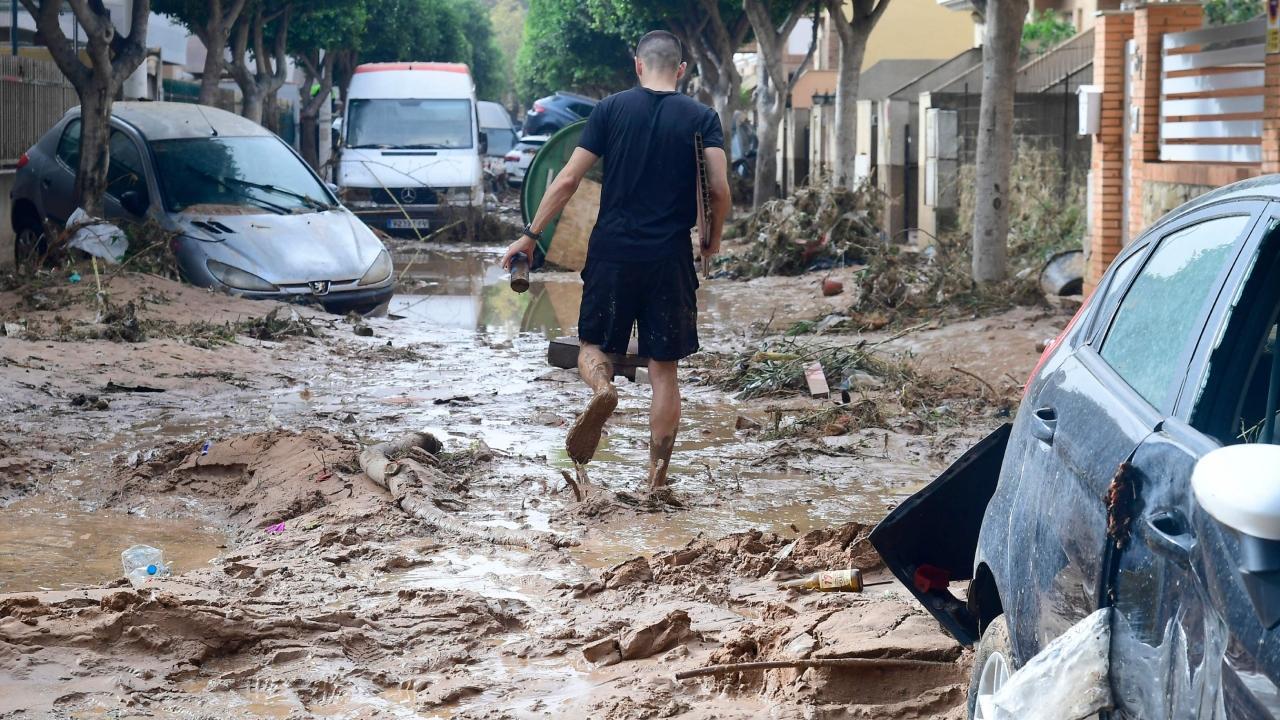The 24 crew members aboard the Ramon Margalef were preparing Friday to use its sensors and submergible robot to map an offshore area of 36 square kilometres

The floods in Spain. File Pic/AFP
A Spanish research vessel that investigates marine ecosystems has been abruptly diverted from its usual task to take on a new job: Helping in the increasingly desperate search for the missing from Spain's floods.
ADVERTISEMENT
The 24 crew members aboard the Ramon Margalef were preparing Friday to use its sensors and submergible robot to map an offshore area of 36 square kilometres —- the equivalent of more than 5,000 soccer fields —- to see if they can locate vehicles that last week's catastrophic floods swept into the Mediterranean Sea.
The hope is that a map of sunken vehicles could lead to the recovery of bodies. Nearly a hundred people have been officially declared missing, and authorities admit that is likely they are more people unaccounted for in addition to the over 200 declared dead.
Pablo Carrera, the marine biologist leading the mission, estimates that in 10 days his team will be able to hand over useful information to police and emergency services. Without a map, he said it would be practically impossible for police to carry out an effective and systematic recovery operation to reach vehicles that ended up on the seabed.
“It would be like finding a needle in a haystack," Carrera told The Associated Press by phone.
Many cars became death traps when the tsunami-like flooding hit on October 29.
The boat will join a wider effort by police and soldiers who have expanded their searches for bodies and the missing beyond the devastated towns and streets. Searchers have used poles to probe into layers of mud while sniffer dogs tried to find scent traces of bodies buried in canal banks and fields. They are also looking at beaches that line the coast.
The first area the Ramon Margalef is searching is the stretch of sea off the Albufera wetlands, where at least some of the water ended up after ripping through villages and the southern outskirts of Valencia city.
Spanish state broadcaster said Friday that the body of one woman had been found on the beach after she went missing when the rushing water swept through her town of Pedralba, roughly an hour's drive from the coast.
Carrera, 60, is head of the fleet of the research vessels run by the Spanish Institute of Oceanography, a government funded science centre under the umbrella of the Spanish National Research Council.
He boarded the Ramon Margalef in Alicante, located down Spain's coast, from where it will set sail to reach Valencia's waters before dawn Saturday. The plan is to go straight to work with the 10 scientists and technicians and 14 sailors working non-stop in shifts. The boat also helped research the impact from the lava flow that reached the sea from the 2021 La Palma volcano eruption in Spain's Canary Islands.
Finding a body at sea, Carrera said, is highly unlikely. So the focus is on large objects that shouldn't be there.
The boat's submergible robot loaded with cameras can dive to a depth of 60 metres to attempt to identify cars. Ideally, they will try to locate license plates, although visibility could be extremely limited and the cars could be smashed to bits or engulfed in the muck, Carrera said.
In the longer term, he said his team will also evaluate the impact of the flood runoff on the marine ecosystem.
Those findings will contribute to initiatives by other Spanish research centres to study Spain's deadliest floods of the century.
Spain is used to the occasional deadly flood produced by autumn storms. But the drought that has hit the country for the past two years and record hot temperatures helped magnify these floods, scientists say.
Spain's meteorological agency said that the 30.4 inches of rain that fell in one hour in the Valencian town of Turis is an all-time national record.
“We have never seen an autumn storm of this intensity,” Carrera said. “We cannot stop climate change, so we have to prepare for its effects.”
This story has been sourced from a third party syndicated feed, agencies. Mid-day accepts no responsibility or liability for its dependability, trustworthiness, reliability and data of the text. Mid-day management/mid-day.com reserves the sole right to alter, delete or remove (without notice) the content in its absolute discretion for any reason whatsoever
 Subscribe today by clicking the link and stay updated with the latest news!" Click here!
Subscribe today by clicking the link and stay updated with the latest news!" Click here!







